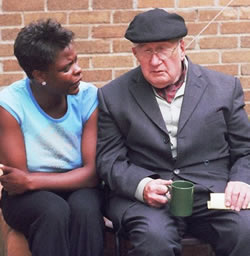Today in my daily Nuzzel newsletter, I shared an excellent article from Faculty Focus that does a great job of exposing the dangers of such conversations. Dangers to students, dangers to our academic institutions, and dangers to ourselves as educators. Although the author, Maryellen Wiemer, admits that occasional venting to a trusted colleagues helps us put things in perspective, she also points out the many harms that outright chronic complaining can do.
I'm not going to summarize that article here—it's best read in it's entirety. However, I'd like to add my two cents. After all, what's the good of having my own blog if I can't do that once in a while, eh?
It took me decades of teaching in high school and college classrooms to fully realize what I think my role as an A&P professor should be. It's not solely to guide well-prepared, self-motivated, highly skilled students to the success that they can easily achieve without me. Sure, that's easy and mostly annoyance-free. But it can be awfully boring. What do they need me for, anyway? Not much.
I came to discover that what really rocks my boat as a professor is when I can help a struggling student achieve even a very small success. When I can help a learning-disabled student find ways to "get it" when studying those messy histology specimens. When I can help under-prepared students "catch up" and learn some effective study skills to continue keeping up. When I can get through to unfocused, unmotivated, immature students in some small way.
We pay a lot of lip service to making our courses "student centered" and making carefully devised learning outcomes our primary goal, but we often just don't want to do the work—or put up with the frustrations—of really making that happen.
It's when I finally started embracing those challenges and leaving aside my unhelpful judgments of "students these days" that I finally started truly and totally loving teaching my A&P students. I found that the more I connected with "problem students," the closer I got to finding the underlying reasons for their apparent lack of will or ability—and thus able to help them find appropriate strategies to succeed.
Sometimes, sporadic attendance is more about serious family or health issues than it is about their attitude toward my course. Sometimes, their lack of focus in my class is more about neurological issues, personal emergencies outside the classroom, or side effects of an illness or therapy, than it is about them "not caring" about their learning. Sometimes, their lack of reading is more about dyslexia than it is about laziness.
Sure, it's sometimes hard to face challenges. Otherwise, we wouldn't call them challenges, eh? But when I ask myself, "what kind of teacher do I want to be today?" the answer always comes back to, "the kind who is going to help even the most challenging students." And that makes all the difference.
Want to know more?
Ugly Consequences of Complaining about 'Students These Days'
- Maryellen Weimer. Faculty Focus. 16 November 2016.
- This is the article to which I refer in today's blog post.
- my-ap.us/2fY77ZU
Photo: John Wisbey


1 comment:
A related idea is discussed in WHY EMPATHY HOLDS THE KEY TO TRANSFORMING 21st CENTURY LEARNING at http://my-ap.us/2g4Tqsl
Post a Comment